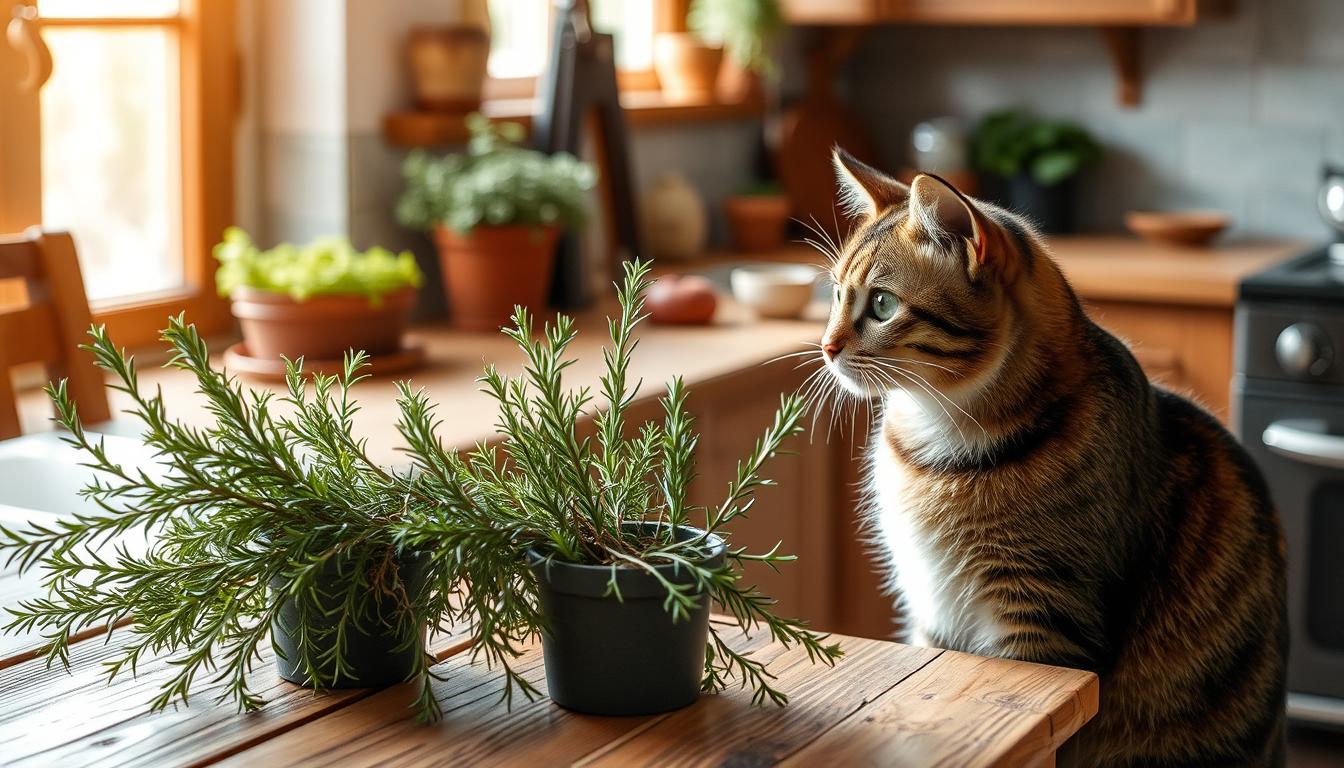As a devoted cat parent, you want to ensure your feline friend’s safety and well-being at all times. When introducing new plants or herbs into your home, it’s key to know their impact. Rosemary, a fragrant and versatile herb, often raises questions for cat owners. But is it safe for our feline friends? This guide will explore rosemary’s safety and its benefits for cats, helping you make informed decisions for their health and happiness.
Table of Contents
Understanding Rosemary and Its Effects on Cats
Rosemary is a fragrant herb often used in cooking. It can have an interesting effect on cats. While it’s generally safe for them, it’s key to know how cats handle herbs to keep them safe.
Chemical Composition of Rosemary
Rosemary has oils like camphor and linalool. These can upset a cat’s stomach if they eat too much. This might cause vomiting or diarrhea.
How Cats Process Herbs
Cats are meat-eaters and can’t digest some plant compounds well. This makes some herbs hard for them to digest, even a little bit.
Natural Cat Behavior with Plants
Some cats might like the smell of rosemary and play with it. Others might not care for it. This curiosity can be good for indoor cats, making their space more interesting.
| Rosemary Compound | Effect on Cats |
|---|---|
| Camphor | Can cause digestive upset in large quantities |
| Linalool | Can also contribute to digestive issues if consumed in excess |
While rosemary compounds are mostly safe for cats in small amounts, feline herb digestion is delicate. Knowing how cats interact with plants helps keep them safe and happy.
Is Rosemary Safe for Cats
Rosemary is a fragrant herb used in cooking and home remedies. But, it’s a concern for cat owners. It’s important to know if rosemary is safe for our pets.
The ASPCA says rosemary is safe for cats. This means small amounts of fresh or dried rosemary are okay. But, the safety depends on how much and in what form it’s given.
Rosemary might upset a cat’s stomach if eaten too much. Cats can’t digest plant material well. Also, rosemary essential oils are harmful to cats and can affect their nervous system.
Always talk to your vet before adding new herbs or plants, even if they seem safe. Knowing about rosemary’s safety helps keep your cat healthy and happy.
| Herb | Safety for Cats |
|---|---|
| Rosemary | Generally safe in small amounts, but essential oils should be avoided |
| Basil | Safe for cats |
| Cilantro | Safe for cats |
| Dill | Safe for cats |
| Sage | Safe for cats |
| Thyme | Safe for cats |
Even though rosemary is safe in small amounts, be careful with your cat’s health. If your cat acts differently after being near rosemary, call your vet. They can give you the best advice.
Rosemary Plants vs. Essential Oils: What Cat Owners Should Know
It’s important to know the difference between fresh or dried rosemary and its essential oil. Fresh and dried rosemary are usually safe for cats. But rosemary essential oils can be very harmful to them.
Fresh and Dried Rosemary Safety
Cat owners can breathe a sigh of relief. Fresh and dried rosemary are generally safe. Cats can safely eat the leaves or rub against the plant. It’s even used in many spice blends and can be a fun treat for cats.
Dangers of Rosemary Essential Oils
Rosemary essential oils, however, are a different story. They can be very toxic to cats because they are so sensitive. Cats can get skin irritation, a slow heart rate, and even seizures from these oils. Cats lack certain liver enzymes needed to break down these strong compounds.
Different Forms of Rosemary Exposure
Cats can be exposed to rosemary in many ways. This includes rosemary plants, dried rosemary in cooking, and rosemary essential oils in diffusers. The type and concentration of rosemary matter a lot. Essential oils are the biggest risk.
As a pet owner, it’s key to be careful with new herbs or plants. While fresh and dried rosemary is okay in small amounts, stay away from rosemary essential oils. This keeps your cat safe and healthy.
Potential Benefits of Rosemary for Felines
Rosemary is not usually good for cats to eat often. But, it has some benefits that cat owners should know. It has antioxidants that help a cat’s immune and nervous systems. It also has anti-inflammatory compounds that might help with bowel diseases and skin issues.
Rosemary also has important vitamins and minerals. It has Vitamin A, Vitamin C, Vitamin B6, folate, calcium, iron, and magnesium. These nutrients help keep cats healthy and happy. Plus, rosemary can be a fun way for cats to smell, roll, and chew, which is good for their natural behavior.
But, it’s key to remember that these benefits are mostly based on theory. There aren’t any studies that show how rosemary affects cats. So, cat owners should be careful and talk to their vet before giving rosemary to their pets.
“Rosemary is a versatile herb that may provide some benefits for cats, but more research is needed to fully understand its impact on feline health and well-being.”
When it comes to feline herb nutrition and cat enrichment plants, rosemary should be used with caution. It might have some good points, but how safe and effective it is for cats is still being studied and talked about.
Signs of Rosemary Toxicity in Cats
Not all herbs are safe for cats. While rosemary is usually okay in small amounts, too much can be harmful. It’s important for cat owners to know the signs of rosemary poisoning.
Immediate Symptoms to Watch For
If your cat eats rosemary, watch for these signs:
- Vomiting
- Diarrhea
- Lack of appetite
These symptoms happen because the cat’s body reacts to rosemary’s oils.
Long-term Health Concerns
Long-term, rosemary can harm a cat’s liver. It can also affect the nervous system, leading to problems like seizures. This is because of the essential oils in rosemary.
When to Contact Your Veterinarian
If your cat shows signs of rosemary poisoning, call your vet. Symptoms like vomiting or lethargy need quick attention. If your cat’s symptoms last or get worse, see your vet fast. Early help is key to keeping your cat safe.
Knowing the signs of rosemary toxicity helps protect your cat. Keep an eye on your pet and talk to your vet often. This way, you can ensure your cat stays healthy and happy.
Safe Ways to Introduce Rosemary to Your Cat
Introducing cat-safe rosemary to your cat can be fun and safe. It’s a great way to add something new to their life. But, it’s important to do it slowly and watch how they react.
Start by giving your cat small pieces of fresh rosemary for cats to play with. This lets them explore the herb’s smell and feel. You can also mix a little bit of dried or fresh rosemary into their food. This adds a nice flavor.
For extra fun, sprinkle dried rosemary on their scratching pads. It helps them scratch and groom naturally. Plus, it lets them smell the herb. You can also grow rosemary in pots indoors. This lets your cat play with the plant and learn about it.
When giving rosemary for cats as treats, be careful not to overdo it. Treats should only make up 10% of their daily food. This keeps them healthy and happy.
Always watch your cat when introducing new things, like rosemary. Some cats might not like it as much as others. If they seem upset or uncomfortable, stop right away. Talk to your vet if you’re worried.

By slowly and carefully introducing cat-safe rosemary, you can make your cat’s life more interesting. And you’ll make sure they stay safe and happy.
Alternative Safe Herbs for Cats
As cat owners, we must think about the plants and herbs we let our cats near. Rosemary isn’t safe, but there are many cat-safe herbs and feline-friendly plants. These can make your cat garden better and safer for your pet.
Cat-Friendly Garden Options
- Catnip: Cats love it, and it keeps them busy for hours.
- Catmint: It’s like catnip but from the mint family, and it excites your cat’s senses.
- Thyme: It’s safe for cats and can help them relax and feel better.
- Valerian: It’s a good alternative to catnip and makes cats feel lively.
Indoor Plant Recommendations
For a cat-friendly indoor garden, try these:
- Boston Ferns: They’re easy to care for and clean the air in your home.
- Bamboo Palms: Their big leaves make your space feel calm and natural.
- Areca Palms: They’re elegant, clean the air, and are safe for cats.
Always check a plant’s safety before bringing it home. Some herbs, even if related to safe ones, can harm your cat.
“Herbs like Lemongrass, Mint, Oregano, and Tarragon can irritate a cat’s digestive system causing vomiting and diarrhea.”
Knowing the cat-safe herbs and feline-friendly plants lets you create a great indoor cat garden. It’s safe and fun for your cat.
Prevention and Safety Measures
To keep your garden safe for pets, being proactive is key. Make sure to keep rosemary plants away from your cats. Also, avoid using rosemary essential oils, as cats are very sensitive to them.
Watching your cat around plants is important. Create a special area for them with safe plants like catnip. You can also use sprays or barriers to keep them away from harmful plants.
Teach everyone in your home about safe and unsafe plants for cats. This knowledge helps prevent accidents and keeps your home safe for pets. By doing this, you can enjoy a safe and beautiful garden for both you and your cat.

Some common herbs like garlic, chives, and marijuana are very bad for cats. Even essential oils from plants like chamomile can be dangerous. Being careful and making smart choices helps keep your outdoor space safe for you and your cat.
| Herb | Toxicity to Cats | Potential Symptoms |
|---|---|---|
| Garlic, Chives | Highly Toxic | Damage to red blood cells, anemia, potential death |
| Marijuana | Highly Toxic | Prolonged depression, vomiting, incoordination, seizure, potential death |
| German Chamomile | Safe | N/A |
| English/Garden/Roman/True Chamomile | Toxic | Contact dermatitis, vomiting, diarrhea, allergic reactions |
| St. John’s Wort | Toxic | Photosensitization |
| Lemongrass, Mint, Oregano, Tarragon | Toxic | Vomiting, diarrhea |
By following these safety tips, you can make a safe garden for your cat. This way, they can enjoy the outdoors without worry.
Proper Plant Placement and Cat Deterrent Methods
When adding rosemary to your home or garden, where you place it matters. Put rosemary plants where your cat can’t reach them, like in hanging baskets or high shelves. This keeps your cat safe from the herb’s potential harm.
Use natural cat repellents like citrus peels or coffee grounds around the plants. Cats usually don’t like these smells. They help keep your cat away from the rosemary.
Think about using cat repellent sprays that are safe for plants and pets. These sprays have a smell that cats don’t like but won’t hurt your plants. You can also use rocks, pine cones, or chicken wire to block your cat’s access to the plants.
Give your cat something else to do, like a cat tree or window perch near the plants. This can distract them from the rosemary. Also, keep your plants trimmed to reduce leaves that might attract your cat. With the right placement and deterrents, you can enjoy rosemary safely with your cat.


1 thought on “Is Rosemary Safe for Cats : Essential Guide”